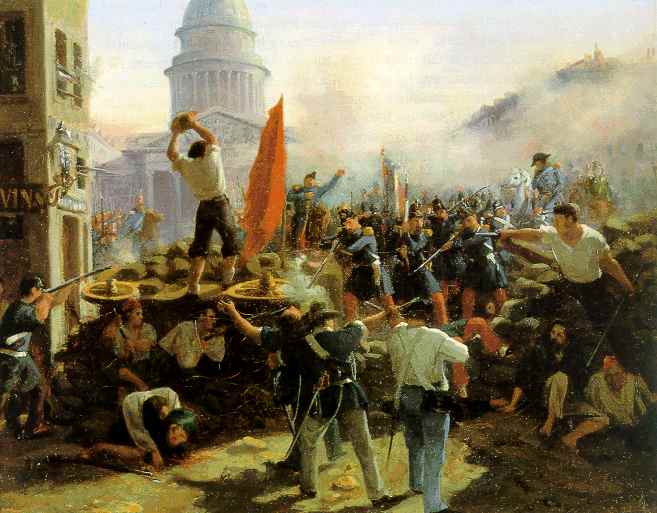 Above Horace Vernet’s famous painting, “Barricade on the rue Soufflot”.
Above Horace Vernet’s famous painting, “Barricade on the rue Soufflot”.
The Revolutions of 1848, known in some countries as the Spring of Nations, People’s Spring, Springtime of the Peoples, or the Year of Revolution, were a series of political upheavals throughout Europe in 1848. It remains the most widespread revolutionary wave in European history. Until now?
Were one asked to assign a start date to the revolutions of 1848 a good choice would be Monday 21st February 1848, the day “The Communist Manifesto” was published (in German) in London by Karl Marx and Friedrich Engels at the request of the Communist League (an organization consisting principally of German workers). The revolutions persisted into 1849.
Given the result of the US Presidential Election of Tuesday 8th November, 2016 there is no doubt that 2016 can now be called “The Year of Revolution”.
Were one asked to assign a start date to this revolution how about Saturday 20th February 2016 when the Chameleon and the EU finalised the deal the infamous non binding agreement that was “The Agreement that Never Was.”
Looking back, this “not even a fig leaf”, this piece of paper with Mr Tusk’s signature on it, can be said to have sealed the fate of the Europhiles. This refusal to give Chameleon the Remainian anything significant or binding put the skids under his efforts to keep the UK in the EU.
Thus just as the ancien régimes of Europe in refusing to cede any concessions at all to the protesting masses lit their own funeral pyres the ancien régime that now sits in Brussels lit the funeral pyre that was the UK’s EU membership.
The result? The Brexit Revolution of Thursday 23rd June 2016.
The characteristic that appears to be repeating itself 164 years later is that one act of revolution in one country has an encouraging effect on others in other countries. One of the most significant events during the 2016 Presidential campaign was the arrival in the USA of Mr Farage and Mr Trump making reference to Brexit. There appears now to e remarkable similarities in both campaigns. Brexit was delivered by white working class voters in Labour’s heartlands rebelling against their Europhile Labour MPs and voting Leave instead of Remain. Mr Trump’s victory was delivered by white working class voters in the USA’s “rust belt” who were let down by the politically correct Democrat elite of which Hillary Clinton was the doyen. Now we can see why Mr Trump said the things he said. His outrageous comments were deliberate and planned as by making them he demonstrated in the most public way possible that he was what the Americans call, “An ordinary Joe”.
Mr Trump’s victory may well be a hammer blow to the present status quo in Europe. Mr Trump is on record of wanting better relations with Russia. He will want to ease tension. This will mean giving Mr Putin what he wants: lifting sanctions against Russia and giving Mr Putin more or less a free hand to support the Assad regime in Syria.
Mr Trump has promised US $600 billion in infrastructure investments for the USA. Anybody who has been on an American railroad or driven on an inner city road will know that this infrastructure investment is needed. Badly.
Mr Trump also wants to cut taxes.
Something will have to give.
This is where Mr Putin comes in.
Good relations and an understanding between Russia and the USA will allow Mr Trump to begin to disengage the USA from NATO.
This will be a hammer blow to the EU’s ancien régime.
It is likely that Mr Trump and Mr Putin will meet shortly after Mr Trump takes office.
It is possible that Mr Putin will be the first or among the first foreign leaders that Mr Trump will meet.
Such developments will have a great influence of the Dutch, French and German elections in 2017.
It may well be that following the UK’s Supreme Court decision to uphold the LCJ’s ruling vis-à-vis statutory authority to invoke Article 50, Mrs May’s efforts to get the Bill enacted will mean that Article 50 will not be submitted by the end of March 2017.
Given the election of Mr Trump and the likelihood of a US/Russia rapprochement, Mrs May would be well advised to take the “Golden Opportunity” afforded by Parliamentary delays in getting the legislation onto the statue book.
Should there be dramatic changes to the governments of the Netherlands, France and Germany the whole European picture could change.
As the Chinese like to say: “We are living in interesting times.”
Speaking the Truth unto the Nation
